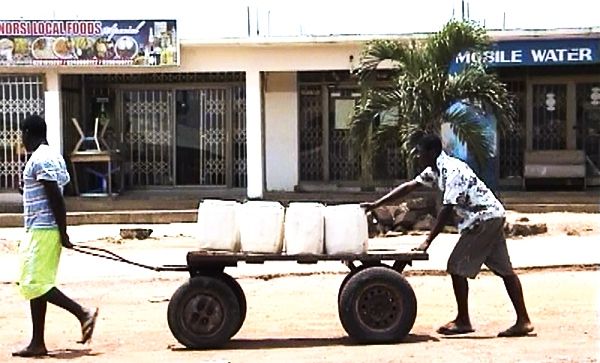
Water for all, time to work on inequalities in access to safe water
It was a Saturday morning, and there was a long queue of people carrying either yellow gallon or pan.
It is an agonising long walk to muddy and sometimes dry streams in search of water.
Advertisement
Sometimes, by the time the weary souls get home, half of the water would have been consumed by the baked earth.
Although tired from the week’s activities, Mabel Adongo, a 15 -year-old class six pupil, and her compatriots in Bawa Akura, in the Kintampo North District, have to walk four miles to the Wokonya stream in search of fresh water every morning before going to school and in the evening after school.
Just like many parts of rural Ghana, at the heart of this daily struggle to survive are the women and young girls whose responsibility is to trek for hours daily to reach the muddy streams, ponds and dry river beds in search of water.
In Bawa Ekura, a farming community of about 2,000 people, water from the Wokonya stream is the only source of water supply.
The long and tiring search for water daily has its consequences on these schoolchildren.
Mabel said she woke up as early as 3a.m. to make it to the stream to prepare for school before the sun rises.
“I do not want to miss classes or drop out of school,” she said, wearing a worried expression on a sleepy face.
The water she fetches is used by her family of six for cooking, drinking, washing and for other domestic use.
Mabel dreams of becoming a nurse in future and wished her community would have boreholes with water flowing regularly.
A dream
But to Mr Kwesi Kunde, a farmer in the Bawa Ekura community, having access to clean water might be a dream that might never be realised for Mabel.
Although three boreholes have been dug by the district assembly and non-governmental agencies as part of efforts to ensure water supply to the residents in the area “the digging always ends up with a dry pit no matter how deep they dig, even with sophisticated machines.”
To him the water challenge is the main problem of residents of the area who are mostly farmers.
“We cultivate yam, groundnut, millet, rice and maize and we all depend on the rains.
If the rainfall pattern fails us in a particular year we just have to wait for the next year,” he said.
He urged the government to explore other alternative sources of providing safe drinking water to the residents of Bawa Ekura.
SDGs
March 22 has been set aside by the United Nations for countries to focus attention on the importance of water.
This year’s theme “leaving no one behind” focused on how to tackle the water crisis by addressing the reasons why so many people were being left behind.
It adapted the central promise of the 2030 Agenda for Sustainable Development.
Two out of the 17 goals of the Sustainable Development Goals (SDGs) focuses on water.
Goal six enjoins countries to ensure availability and the sustainable management of water and sanitation for all while Goal 10 emphasises the need to reduce inequalities within countries.
NGOs
For the Vice Chairman of the Coalition of Non Governmental Organisations in Water and Sanitation (CONIWAS), Mr Atta Arhin “there is vast inequality in access to safe drinking water in Ghana”
To him “access to safe water is a fundamental human right of every citizen”
Yet, he expressed regret that “while some urban dwellers use treated water that meets World Health Organisation (WHO) standards to water their gardens or wash their cars some rural dwellers have to travel distances in search of contaminated water.”
With the current levels of inequalities in water supply, Mr Arhin said if nothing changes it would not be possible for Ghana to meet the SDGs for Water.
Statistics
Citing the 2017 and 2018 Multiple Indicator Cluster Survey report by the Ghana Statistical Service, Mr Arhin said it revealed that there were vast inequalities between the rich and the poor, with respect to water supply in Ghana.
Also the report showed the inequalities between urban and rural communities, between administrative regions, and between the educated and uneducated.
“The rich person in Ghana is 46 per cent more likely to have access to improved sources of drinking water than the poor,” he said.
He said according to the report while 98 per cent of people living in the Greater Accra Region have access to improved basic water supply services only 50 per cent of people in the Northern Region have same access, leaving a gap of 48 per cent between the two regions.
Consequences
Inequalities in accessing water supply, he said, further entrenched poverty among the poor, since they were compelled to spend more time fetching water than their richer counterparts.
“As a country, we cannot allow background circumstances, income or educational levels to determine who drinks water from improved or contaminated sources,” he said.
He called on the goverment to take a deliberate programme of action to correct the inequalities.



